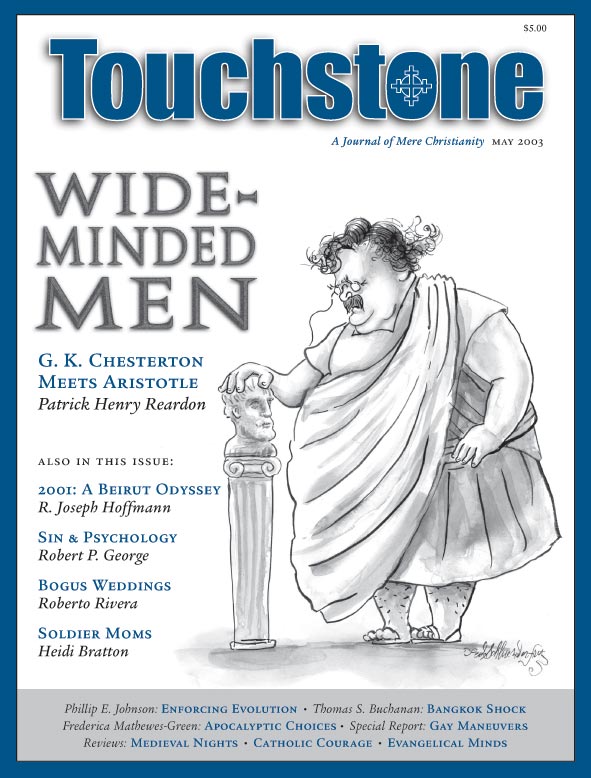The Trouble with Weddings
Roberto Rivera on Symbols & Substance
Never play poker with a man named Doc, never eat at a place called “Mom’s” and never sleep with a woman whose problems are worse than your own.
—Nelson Algren
To this advice, I’d add a codicil: never watch the local news. (Actually, never watch any television news.) Sometimes you have to make an exception, as I did the other day because of the threat of heavy weather. Instead of the weather, my local NBC-owned-and-operated station gave me two reports that reminded me of why I had added my codicil to Algren’s list. The first was a report on WorldCom’s transgressions and its impact on the Washington area. I couldn’t decide which was more amusing: the degree to which the anchor was out of her depth in talking to a financial reporter about the story, or the contrived grave look on her face—a look that told the audience, “This is important.”
Fortunately for her, the broadcast soon turned to a story that didn’t require her to be at odds with the Botox coursing through her muscles: the news that a local couple had been chosen from among 3,000 entries as the winner of the year’s “Today Throws A Wedding.” The affianced pair, whom I’ll call Marianne and Johan, will receive a “dream wedding” courtesy of the Today Show. The only catch is that viewers of that show will have a hand in directing nearly every scene of the upcoming marriage. They will have a say in the rings, the invitations, the honeymoon, and even the pajamas they take on their honeymoon. As the reporter put it, while “money can’t buy love, it can buy a beautiful wedding.”
Excuse me while I throw up. This use as a form of entertainment of what, after all, is a sacrament is of a piece with another cultural trend: getting married in odd locales, such as home plate, the end zone, while skydiving, etc. It trivializes the occasion. It further dilutes whatever moral and theological content the occasion possesses and renders it little more than a social affair—like a Halloween or Super Bowl party, just a little less frequent. As John Barton, the archdeacon of Astin, told the Birmingham—England, not Alabama—Post, this trend is turning marriage into something “ordinary.”
Impoverished Notions
But it isn’t only odd locales that embody our impoverished notions about the institution of marriage. This impoverishment is also manifested in our mania for expensive and lavish weddings. Marianne and Johan are hardly unique in their willingness to go overboard to get everything just right for that special day.
According to The Knot, a wedding planning website, Americans spend $70 billion annually on weddings, and the average “traditional” wedding costs $20,000. For many couples, the only way to get a handle on the whole ungehpotchkeyed mess is to hire a “wedding planner.” I want everyone who believes in telekinesis to raise my hand. Good. Now, I want everyone who thinks that all these people hiring all these planners are approaching marriage with something vaguely resembling a Christian understanding of the subject to raise their hands.
At the risk of seeming cynical and terminally grumpy, our mania with expensive and lavish weddings is inversely proportionate to our appreciation and regard for the theological and moral significance of the event. (White Vera Wang wedding gowns worn by brides who have lived with the groom for two years, anyone?) Stated differently, since we cannot or will not bring ourselves to consider what is the true nature of marriage, we attempt to purchase some of marriage’s meaning and significance by staging elaborate weddings.
(By the way, if I had a daughter, and could afford to spend 20 to 30 thousand dollars on her wedding, I pray that I would have the courage to say something like this to her: “I’ll tell you what. I’ll pay for a modest affair. Ten years from now, give me a tenth anniversary and a grandkid or two, and I’ll give you the rest. You can throw a party, go on a second honeymoon, or both.”)
Buying Authenticity
This commodification of meaning isn’t limited to weddings. It’s Martha Stewart’s stock-in-trade. I’m not dumping on her. Like Rod Dreher of the National Review, I am grateful for Stewart’s contribution to eradicating the scourge of synthetic fibers from our green and pleasant land, although his stated admiration for Martha Stewart’s Living did remind me of the IKEA catalogue scene in Fight Club. However, Stewart’s domesticity is purely a matter of aesthetics—a “lifestyle statement,” if you will. It says nothing about what is important or who we are. It’s just about how we look. We’re not talking about a “Proverbs 31 woman” or the Roman woman and her domus here.
Roberto Rivera is a Fellow at the Wilberforce Forum at Prison Fellowship. His work has appeared in Books & Culture, and he is also a regular contributor to the web magazine Boundless. He is a contributing editor for Touchstone.
subscription options
Order
Print/Online Subscription

Get six issues (one year) of Touchstone PLUS full online access including pdf downloads for only $39.95. That's only $3.34 per month!
Order
Online Only
Subscription

Get a one-year full-access subscription to the Touchstone online archives for only $19.95. That's only $1.66 per month!
bulk subscriptions
Order Touchstone subscriptions in bulk and save $10 per sub! Each subscription includes 6 issues of Touchstone plus full online access to touchstonemag.com—including archives, videos, and pdf downloads of recent issues for only $29.95 each! Great for churches or study groups.
Transactions will be processed on a secure server.
more from the online archives
calling all readers
Please Donate
"There are magazines worth reading but few worth saving . . . Touchstone is just such a magazine."
—Alice von Hildebrand
"Here we do not concede one square millimeter of territory to falsehood, folly, contemporary sentimentality, or fashion. We speak the truth, and let God be our judge. . . . Touchstone is the one committedly Christian conservative journal."
—Anthony Esolen, Touchstone senior editor










